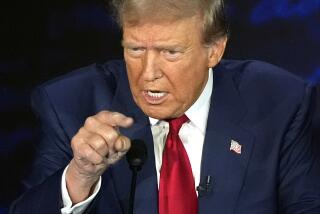Bush Wins Praise From Some Critics for His Leadership
Before Sept. 11, some Americans didn’t think very much of George W. Bush. He is where he is because of his father, they said. He’s not particularly smart, articulate or inspiring, they said. He stole the presidency, they said.
But after the terrorist attacks that day, and Bush’s ensuing address to Congress, many former critics--whether political leaders or working men and women--are putting aside their differences. Though not endorsing everything Bush has said and done in recent days, many Bush detractors are giving the Republican president their support in this time of national crisis.
Under different circumstances, Rep. Loretta Sanchez (D-Santa Ana) would have few, if any, positive words for Bush’s politics or leadership. But that was before. After Thursday night’s address to a joint session of Congress, Sanchez was reassured that Bush is capable of leading the nation--something she had doubted all week.
“It was a transformation for him,” she said. “It’s the first time he filled the expectations of presidential presence. That’s what we are all hoping for regardless of what party we’re in.”
Rep. Maxine Waters (D-Los Angeles), who vigorously campaigned for former Vice President Al Gore in his presidential bid, was similarly impressed. “He hit a home run,” she said of his speech. “We may disagree later, but now is not the time. They are still digging the bodies out of the rubble . . . and there are still children asking where their mommas and daddies are. The nation is still in mourning, and this is not the time to fight the president.”
It’s not just politicians who are overcoming their hesitation to support the president. Adriana Martinez, a 30-year-old MBA student at UCLA, voted for Gore and says she has never thought highly of Bush.
“Most people want to support him and I guess I do, but I’m a bit scared,” she said. “We have to be united as a country, and he’s the only president we have.”
Historians note that Americans typically pull together during national emergencies. With the extent of animosity among Democrats that greeted Bush’s election, bipartisan cooperation was not a given. But the reception to his presidency has dramatically changed from the first days of his administration, said Michael J. Birkner, professor of history at Gettysburg College in Pennsylvania.
“This event is a galvanizing event,” said Birkner, who specializes in 20th century American history. “You’re not hearing things like, ‘He’s illegitimate,’ or ‘He’s too small for the job,’ anymore. I think that has as much to do with America’s patriotism as much as anything Bush has done thus far.”
Polls indicate a groundswell of recent support for a president who gained the office while losing the popular vote. In April, Bush’s approval ratings hovered around 57%. An ABC poll taken after Bush’s congressional address put his rating at 91%.
Even so, few could have predicted Bush’s popularity would soar so high, especially with his former critics, given his performance during the first hours of the crisis. As a few pointed out, Bush was no Winston Churchill, who spoke eloquently amid the rubble of his bomb-damaged country, in the first hours after the attack.
“He was very shaky at first, but I resisted the urge to write a piece saying that, because I didn’t think it was appropriate,” said Jacob Weisberg, a New York-based journalist with Slate magazine who has frequently been critical of Bush. “I think he’s now emerging as a very effective wartime leader.”
In fact, Weisberg has indefinitely suspended his popular feature called “Bush-isms,” which highlights many of the president’s non sequiturs and speaking gaffes. “Bush deserves the benefit of the doubt to an enormous degree,” Weisberg said. “He needs to rally the nation. I want to contribute to that effort to the extent that I can.”
Bush’s efforts to reach out to the nation’s Arab and Muslim communities have won praise from many traditional critics as well. Democrat Steven Ybarra, chairman of the California/Chicano/Latino Caucus, is especially pleased with the president’s repeated urging of tolerance for Arab Americans and Muslim Americans and with his visit to Washington’s Islamic Center, where Bush removed his shoes and stood side by side with Muslims.
“I think that’s a really important gesture. It’s beyond a gesture when you consider the really stupid people who are committing horrible acts against [Arab Americans] here,” said Ybarra.
Bush’s colorful language, such as remarks that the former Texas governor wanted Osama bin Laden “dead or alive” and repeated comments that he wants to “smoke ‘em out,” did little to reassure some citizens that Bush wouldn’t overreact when planning retaliation.
“When he said those things, it was kind of scary,” said Kathryn Riccio, a television producer who lives in West Los Angeles. “I’m trying to remain supportive of him, but the jury is still out.”
More to Read
Get the L.A. Times Politics newsletter
Deeply reported insights into legislation, politics and policy from Sacramento, Washington and beyond. In your inbox three times per week.
You may occasionally receive promotional content from the Los Angeles Times.










